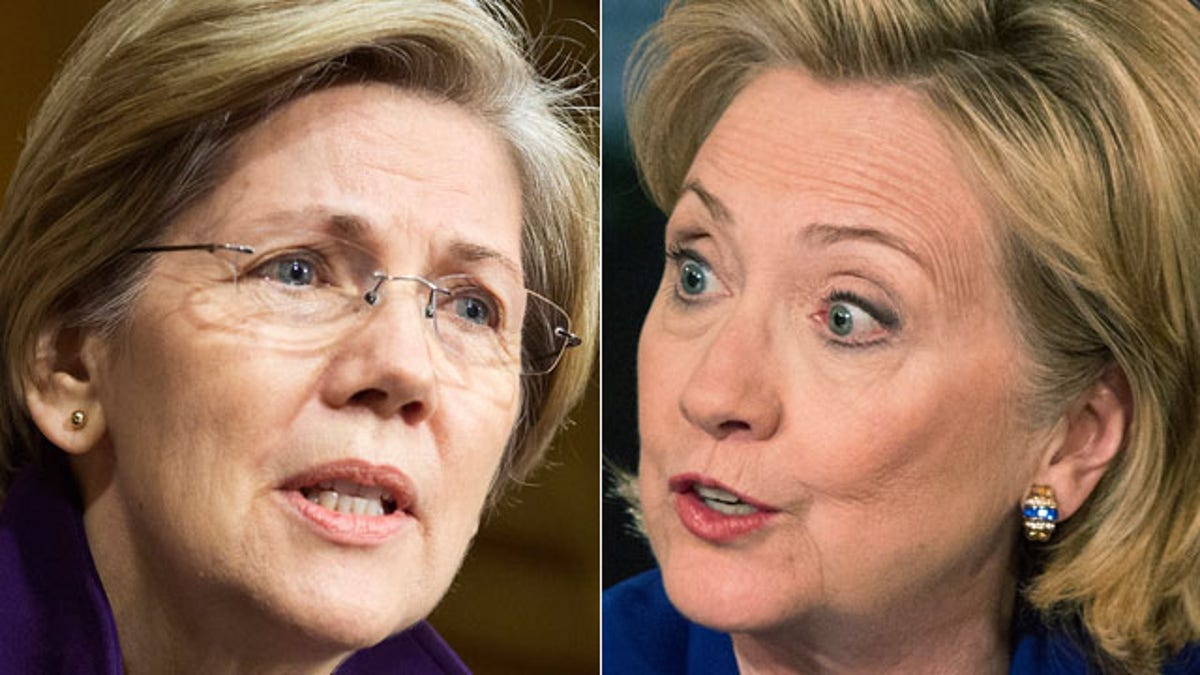
Sen. Elizabeth Warren, left, and Hillary Clinton. (Reuters)
The media chatter about Hillary Clinton’s wealth has sparked a broader debate over whether she is vulnerable to a populist challenge from the left.
This, of course, fills the void left by the fact that Hillary is the overwhelming Democratic favorite, depriving pundits of a primary race. And hey, July 4th weekend is approaching. But it does get at some deeper questions about her political persona, her candidacy and, if she wins, how she would govern.
Elizabeth Warren is ritually invoked in these scenarios, despite the fact that the Massachusetts senator has made perfectly clear she has no intention of running in 2016. But to the extent that Warren stands for a full-throated, anti-Wall Street liberalism, she’s a useful foil in sizing up Hillary.
Is the multimillionaire out of step with a party that is angry about fat-cat bankers and income inequality? If so, why does she enjoy such sky-high popularity ratings among Democrats?
A pair of essays from the right and left sheds light on what might be called the Hillary Paradox.
National Review’s Jonah Goldberg agrees with Warren on almost nothing, but is summoning her nonetheless:
“Paging Elizabeth Warren: This is your moment…
“Warren is perfectly poised to be the Obama of 2016. And the role of Hillary Clinton will be played by Hillary Clinton…Warren would be able to defuse Clinton's greatest asset (her gender) and exploit Clinton's greatest liability (her wealth and how she came by it) while in the process generating huge excitement from the status-quo-weary grass roots.”
Elizabeth, who’s not a stirring speaker or natural politician, may or may not excite the rank and file. But the idea of Warren is certainly popular on the left.
“Clinton made her money by giving $200,000 speeches to corporate fat cats and trading on her connections. She may think that making millions for boring books and flying around in rented private jets to give really boring speeches is a fair wage for fair work. Heck, maybe it is! But she simply lacks the political talent to sell that interpretation…
“Clinton's ‘inevitability’ is itself a kind of unearned special treatment during a time when special treatment for rich insiders ticks off everyone. Warren should say so.”
But if Warren doesn’t plan to run—or thinks Hillary is unstoppable—what's the benefit of taking on a potential president of her own party?
There’s an implicit reminder here that the media collectively declared Hillary inevitable in 2007, and that didn’t turn out so well. What if the pundits are wrong again?
Across the spectrum, the New Republic’s Noam Scheiber details what Hillary did to win “a preposterous level of support” among Dems before examining the economic issue. Hillary has the credibility to address the plight of the poor, working poor and middle class, he says, but not so much the gap between the ultra-rich and everyone else:
“Many of her and her husband’s closest economic advisers hail from Wall Street. After hiking the top income tax rate in 1993, they cut the capital gains tax in the late ’90s and deregulated the financial sector. Hillary Clinton has spent decades raising enormous sums from executives at Goldman Sachs and Citigroup, and the Bill, Hillary & Chelsea Clinton Foundation, which she joined after leaving the State Department, survives on the largesse of the 1 percent.
“On her own time, Clinton has enjoyed several six-figure paydays speaking to corporate executives, including two at Goldman Sachs that netted her an estimated $400,000. And, of course, she has repeatedly struggled to justify all the buckraking.”
Here’s the twist. As Scheiber sees it, Hillary’s failure to threaten the entrenched establishment could be an advantage because of “the somewhat disillusioning experience of the Obama years.” He quotes a former Obama pollster as saying:
“It may be that coming out of this period, where Congress has been so obstinate, so difficult to move ... that people are looking for someone whose central skill is how to work the power structure.”
Remember how Barack Obama seemed to many Democrats an inspirational figure in 2008, while Hillary was a mere practical politician? There was that moment during the primaries when she mocked the man who critics dubbed the Messiah: “The skies will open, the light will come down, celestial choirs will be singing and everyone will know we should do the right thing and the world will be perfect.”
Obama didn’t deliver any celestial choirs, and Hillary isn’t promising any. Perhaps a work-within-the-system kinda candidate has some appeal to Democrats after the audacity of hope fell so short.












































